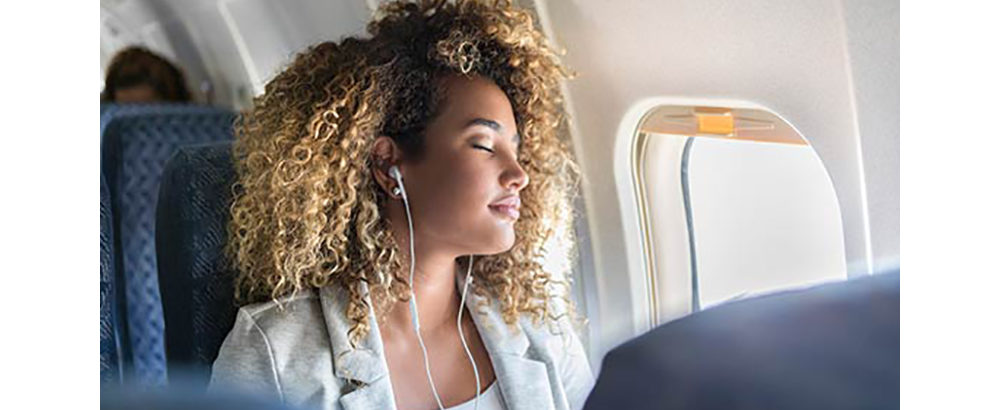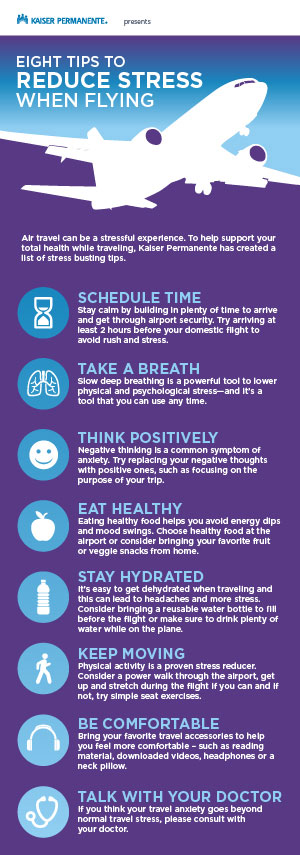This Thanksgiving is expected to be the busiest travel season since 2005 with more than 54 million Americans making plans to journey 50 miles or more away from home for the holiday, according to AAA’s 2018 Thanksgiving Holiday Forecast.
And busy airports can often lead to stressed-out travelers. No matter what airport or travel hub you use, here are some helpful tips to reduce travel-related stress.
Stay calm by building in plenty of time to arrive and get through airport security. The official recommendation from the TSA is to be at the airport two hours before domestic flights and three hours before international ones. And, if you find yourself with extra time at the airport because of a delayed flight, savor those extra moments listening to your favorite music or diving into an interesting book. Some airports even have special rooms where you can practice yoga or meditate in a quiet environment.
Take a breath
Slow, deep breathing is a powerful tool to lower physical and psychological stress — and it’s a tool that you can use anytime. When you breathe deeply, it sends a message to your brain to calm down and relax. And deep breathing exercises can be done anywhere — even in the long lines you’re likely to find at an airport. Check out Kaiser Permanente’s recommended list breathing exercises to help you reduce tension and relieve stress.
Think positively
One of the common symptoms of anxiety is negative thinking. If you are feeling particularly anxious before a flight, you may find that you have negative thoughts running continuously through your mind. Such thoughts can create a feedback loop that makes you even more anxious. The first step of healthy thinking is noticing — and accepting — your negative thoughts, says Don Mordecai, MD, the national leader for mental health and wellness at Kaiser Permanente. Try replacing the negative thought with a positive one, such as focusing on the purpose of your trip and how happy you’ll be when you arrive at your destination.
Eat healthy
Traveling can often mean a disruption to your normal eating patterns. This means you may be more likely to skip meals or choose unhealthy food options on the day you head to the airport. It’s important to eat a healthy meal before you leave for the airport, especially breakfast if you have a morning flight. While at the airport, avoid juice and other sugary or fattening food items to prevent energy dips and mood swings. And while many airport restaurants are introducing healthier food options, you may want to consider bringing healthy snacks with you, such as pieces of fruit and nuts (unsalted or low-salt).
Stay hydrated
Staying hydrated in general is important but drinking water can also be used to combat stress, according to Dr. Mordecai. The body’s organs need water to function properly, and studies show that not drinking enough water can increase the levels of cortisol, a key hormone associated with stress. Dehydration can also contribute to headaches and a general sense of not feeling your best. Stay away from alcohol, which can dehydrate you, and from caffeine, which is a stimulant that can increase anxiety.
Keep moving!
Physical activity is a proven stress reducer. Even low-intensity exercise has been shown to make you feel energized and healthy. So, the next time you’re feeling anxious as you wait for your flight to board, consider taking a power walk up and down the concourse to walk the stress away. You can also try these Kaiser Permanente-recommended seated exercises while in flight or while waiting in the boarding area. If you have a chance to get up and stretch during the flight, by all means do so.
Be comfortable
When preparing for your trip, don’t forget to bring the travel accessories that will help make the flight more comfortable for you, says Dr. Mordecai. For instance, consider bringing books or magazines and don’t forget to download your favorite movies or tv shows to your mobile device. Headphones and neck pillows are other travel accessories that can help make the trip more pleasant.
Talk with your doctor (if anxiety feels beyond your control)
If you think your anxiety goes beyond normal travel stress, Dr. Mordecai says you may want to consult with your doctor. To learn more about anxiety, including symptoms and ways of stopping an anxiety attack, visit Kaiser Permanente’s mental health and wellness information page.
For more healthy travel tips, check out www.kp.org/gohealthy.





